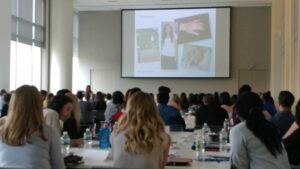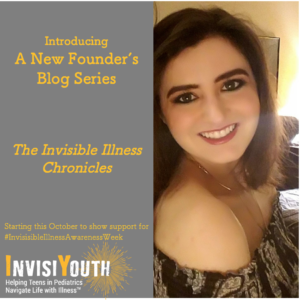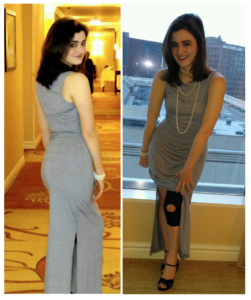October 17th 2017
I constantly get questions about the hacks to living with chronic illness (I mean, that’s what InvisiYouth Charity’s mission in life is all about). Those questions double when it comes to life with an invisible illness. It only seemed appropriate that with part of my monthly blog I would wrote some blogs on topics surrounding invisible illness.
At InvisiYouth, we constantly promote the vitally-needed change of inclusivity on all chronic illnesses. To treat physical health and mental health exactly the same. To show equal support and aid regardless of visibility. To note that invisible illnesses are note just of the mind, but also of the body too. So…to honor if you will, the fact that I live with one foot in both the visible and invisible physical health struggles, I’ll be occasionally posting articles on the unseen struggles. These are appropriately titled “The Invisible Illness Chronicles.”
The biggest struggles living with invisible illness (besides the actual illness itself, of course) is how you can look so healthy and feel so horrible. It can be like you’re living in a sound proof booth without the mic on, everyone can see you, but no one can hear what’s going on. For myself, it’s this weird concept of dealing with all these medical symptoms affecting my nervous system, muscles and vascular system but no one can truly see the damage it takes on my body at all times.
So when my life has to involve the outside world, specially those not in my close inner circle, I feel like I have to put up the mask, to adapt and get through my schedule for the day. I go into business meetings, and conference calls with potential advertisers and Skype calls with older youth health advocates and subconsciously, I put up a front as the “healthy nonprofit owner” because that’s what I know what I look like. Sometimes I’m driving to meetings with slippers and sunglasses, isotoner braces on my ankle, hand and knee, but the second I park my car, I have to take all that off, strap on heels, and put on the boss lady smile to power through meetings.
 Now I say “I have to” like it’s an obligation, but this is a decision I make out of societal structure if I’m honest. I look completely healthy on some days, but anatomically, my RSD and connective tissue does not reflect that at all. I am living with a chronic illness that I have to adapt my entire way of life around it, but the people who do not know me would not know that because I’ve had nine years to master a “new normal” way at life.
Now I say “I have to” like it’s an obligation, but this is a decision I make out of societal structure if I’m honest. I look completely healthy on some days, but anatomically, my RSD and connective tissue does not reflect that at all. I am living with a chronic illness that I have to adapt my entire way of life around it, but the people who do not know me would not know that because I’ve had nine years to master a “new normal” way at life.
Truly, it is exhausting to act like I am healthy, to walk, sit, talk, and be the healthy person my physical body makes everyone think I am. But also, it is equally exhausting to have to explain to every single new person that I meet what my medical situation truly is, to tell them about my chronic illness. So I have make a decision: should I be exhausted by having to try to explain my health to people who I’m just meeting, or be exhausted by acting as healthy as I look?
When you are living with an invisible illness, it can be really hard to be given any true empathy because no one can gage your medical situation by looking at you. No one that is not a family member, sibling, caregiver, boyfriend/girlfriend, or friend knows about the health struggles you live with on a minute by minute basis, so they honesty think everything is completely fine with you. It becomes and ‘all on you’ situation because the world will not automatically feel for your chronic illness because it cannot see it.
You need to dig deep in yourself, find strength and sympathy in yourself for your own journey with your illness. Find comfort in those around the world that are also living with your invisible illness that can relate to your truth.
It’s a two-fold community you need: get your supporters who can build you up like family and friends that are by your side because they love you, and get others in your life living the same journey of invisible illness that relate to you.
That is why I make the conscious decision to put on the mask when I need to be the healthy nonprofit owner that my physical body says I am on some days, to walk into meetings with sponsors or fellow charity owners and I will meet with them for hours of work, getting back into the office completely exhausted and dealing with symptoms and side effects for hours of recovery.
 I repeat, it is so beyond exhausting to act as healthy as I look from both a medical standpoint and mental standpoint because my entire body physically will hurt from the trauma I put onto it to “act healthy” while I also put myself under stress from people just not relating to the situations I am going through.
I repeat, it is so beyond exhausting to act as healthy as I look from both a medical standpoint and mental standpoint because my entire body physically will hurt from the trauma I put onto it to “act healthy” while I also put myself under stress from people just not relating to the situations I am going through.
But there is a bright side to all of this. When I get back to my office, I’m on a mental rush of all the good things that will come from the work that I’m doing, from the philanthropic work I do each day for the young people I get to help.
Also, I sometimes feel like I have to act as healthy as I look when I give speeches to teens, or meet up with old friends. And the funniest thing is that for those hours, none of them will ever know about my health…that is until I reveal that I am living with an invisible illness! It is absolutely amazing when I pull up my photos of the physical symptoms of living with a neurovascular condition and the physical symptoms that sometimes to plague my body that sway the pendulum over to the visible illness category.
It is amazing to see the way people treat me completely changes once they can actually see my illness. And that’s so wrong if I’m honest! There is just an entire new level of recognition on these high schoolers’ faces when these young people can finally see that I am someone that lives with a chronic illness but also lives a completely fulfilled life…I just live it on my own terms the way my body allows, regardless of what society says is “normal.”
T here are so many days I wish I could yell out to the world, take some sort of magic wand and immediately change how society looks at those it deems ‘different’ in one swoop. That invisible illnesses are not something to fear or be confused by, but something to learn from and give empathy to like everything else in life. No one should feel obligated to hide their health, it should just be an automatically understood element to someone’s lifestyle.
here are so many days I wish I could yell out to the world, take some sort of magic wand and immediately change how society looks at those it deems ‘different’ in one swoop. That invisible illnesses are not something to fear or be confused by, but something to learn from and give empathy to like everything else in life. No one should feel obligated to hide their health, it should just be an automatically understood element to someone’s lifestyle.
Everyone is unique, and if we celebrated uniqueness, then we shouldn’t have a problem embracing that when we meet people, because we would constantly be learning.
I always say that living with an invisible illness is like a game of “Where’s Waldo?” The problem is that none of these people were told to were the signature red-and-white striped shirts and black glasses so no one can find them among the crowds throughout the world. It is our job as a society to become vocal and talk so we’re found, and to change the stigmas surrounding invisible illnesses of all kinds.
~Dominique


